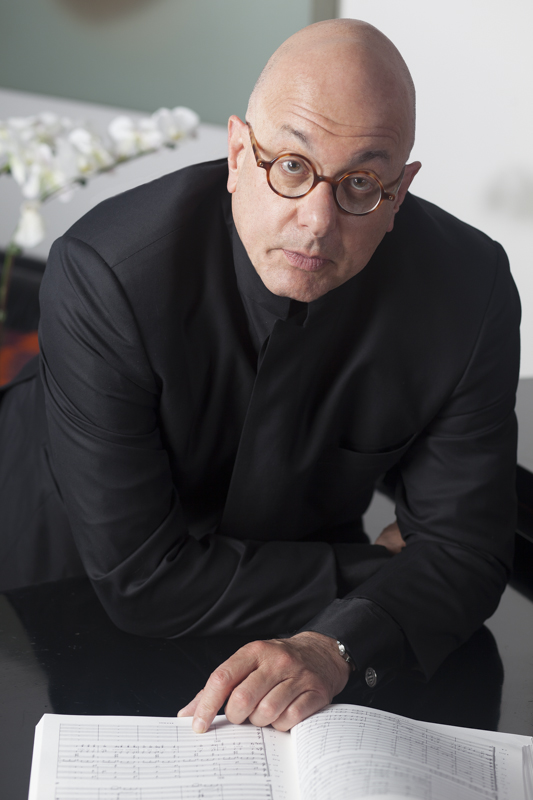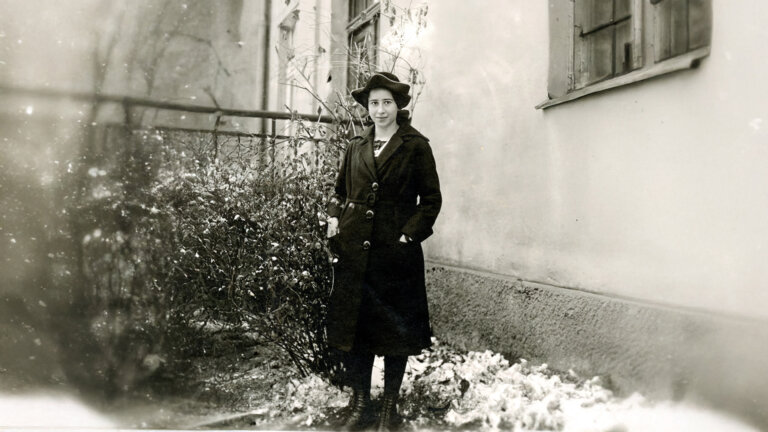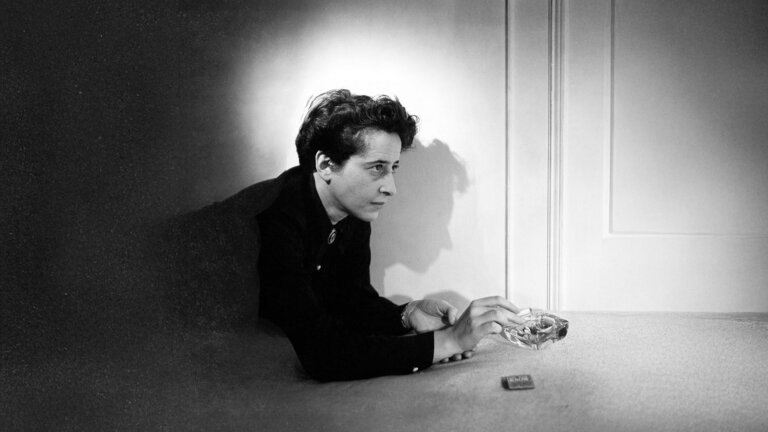Leon Botstein is the President of Bard College, a position he has served since 1975, and serves as music director and principal conductor of the American Symphony Orchestra (ASO), founder and music director of The Orchestra Now (TŌN), artistic codirector of Bard SummerScape and the Bard Music Festival and principal guest conductor of the Jerusalem Symphony Orchestra (JSO). He has served as a guest conductor with the Los Angeles Philharmonic among others around the world.
Botstein also studied under philosopher Hannah Arendt, whom he first met as a 16-year-old first-year undergraduate student at the University of Chicago. He stayed in contact with Arendt throughout her life, including during his early years at Bard as a young college president.
Below, we ask President Botstein about studying with Hannah Arendt, interpreting her work and continuing to reflect on her philosophies today.
1. What first drew you to Hannah Arendt’s work?
I was first drawn to Hannah Arendt’s work by reading what eventually became “Eichmann in Jerusalem,” when it appeared initially as a series of articles in the New Yorker in 1963. It was recommended to me—I was then a senior in high school—by my maternal grandfather who was a survivor of the Warsaw Ghetto and labor camp. He believed Arendt’s analysis to be the most cogent and candid regarding the Holocaust.
I subsequently met Hannah Arendt at the University of Chicago, where she was teaching, that same year during my first year of college. I sat in her lectures and seminars at the Committee on Social Thought. In my senior year, she helped me with my senior honors thesis on Max Weber and the concept of “value neutrality” in the social sciences. She put me in touch with Karl Jaspers, a Weber protégé. I remained in contact with her; she became an advocate of my becoming president of Bard College in 1975. Her husband Heinrich Blücher had taught philosophy at Bard from 1951 until his death. He was buried in the Bard Cemetery, as she is now. I was fascinated by the originality of her insights, the improvisational brilliance of her mind and the distinctive quality of her language, all of which reflected her uncommon capacity to contextualize texts and events brilliantly.
2. How has your understanding of her evolved over the years?
Over the years I have come to appreciate how provocative her work is, even though I do not always find myself in agreement with it. Her insistence on politics as a distinct realm apart from economic matters, led her, in my opinion, to distance herself too greatly from economic theorists including Marx, although her notion of labor and the contrast with work is compelling. In my opinion, she had too romantic a view of democracy in antiquity. As far as “Eichmann in Jerusalem” is concerned, subsequent research has shown that she had the right idea but the wrong protagonist. Perhaps her best books remain “The Origins of Totalitarianism” and “The Human Condition.”
3. How do you interpret her concept of the “banality of evil”?
The banality of evil is a concept Arendt drew from the work of her mentor, Karl Jaspers, whose influence on Arendt is too often overlooked. In 1946, Jaspers wrote a famous short book which was subsequently translated as “The Question of German Guilt.” The arguments in this book are the inspiration for Arendt’s conception of the banality of evil. I understand that concept to refer to behavior, that by commonplace criteria of good and evil not vulnerable to Nietszche’s critique of Christianity (such as “love thy neighbor as thyself”) violates dramatically what we legitimately regard as good, but loses its quality to astonish. In other words, we would like to think of evil and evil-doers as radically different from ourselves. We imagine horrible things to be done by horrible people. We have images of amoral figures like Ivan the Terrible and Charles Manson, or fanatics like Torquemada or, sad to say, Sir Thomas More, who seem abnormal in their lack of capacity for empathy and human suffering. We believe our history is filled with cold-blooded killers that stand out from the ordinary human.
But the Holocaust revealed that radical evil is the work, in modernity, of ordinary people like ourselves.
Arendt’s insight is that the extermination of the 6 million Jews was not accomplished by extraordinarily “evil” persons, but by an industrial and bureaucratic system that manipulated the ideals of legality and efficiency to transform killing and torture into everyday unremarkable activities. The Holocaust was made possible by the enthusiastic participation in the killing of innocent human beings by ordinary functionaries, as if it were just another unremarkable job, justified by the legal system of the Nazis and the premium placed on the rules and practices of a modern bureaucratic system. Therefore, radical evil in the form of the slaughter of innocents became indistinguishable from ordinary, everyday behavior, and was tolerated and enabled with equanimity not only by the participants in the killing apparatus but by its apparently “decent” bystanders.
4. What do you make of Arendt’s relationship with Martin Heidegger given their ideological differences?
In the first instance, Arendt, as a university student, was influenced by Heidegger in the period in which his book “Being and Time” was written and published in 1927. It catapulted him to fame. He became a Nazi after “Being and Time” was published and Arendt had separated from him as a lover. Heidegger’s influence waned as Arendt transferred her loyalties to Jaspers. Her personal relationship with him after the war can be explained simply. In terms of sexual intensity and emotional kinship, for both Arendt and Heidegger, the relationship between them was the love of their lives. For Arendt, love and friendship in this case took precedence over politics.
5. Do you believe the attacks against Arendt after the Eichmann trials were justified?
I think the attacks went well beyond what could be justifiably criticized. Arendt hit a raw nerve in her exposure of the extensive collaboration in the extermination of the Jews by non-Germans. She made it clear that so many people would never have died at the hands of the Nazis had there not been enthusiastic collaboration on the matter of killing Jews by the French, the Poles, the Ukrainians, the Lithuanians and the Hungarians, for example. Indirectly, the apathy and reluctance from America and other neutral nations to take Jews as refugees from 1933 on suggests a complicity in the success of the Holocaust.
Arendt was sympathetic to the Zionist movement which sought to make plain that Jews are not exceptional and are just like everyone else and deserve a homeland. Therefore, she pointed out that within the Jewish leadership during the war, there were Jews (e.g. Chaim Rumkowski in Lodz) who could be legitimately considered collaborators. Arendt’s comprehensive observations regarding the normalization of evil that made collaboration easy came as a rude shock, particularly to the Jewish community that justifiably saw itself as the victim; Jews realized that Arendt’s incisive and subtle observation could be misunderstood as implicitly justifying anti-Semitism in the form of so called “self-hate.”
Her error was the tone of her prose and her failure to underscore strongly enough the pleasure the Nazis took in humiliating their victims. The behavior of the Gestapo and the way concentration camps were run were designed to degrade and dehumanize Jewish victims by reducing them to unbearable misery and desperation so that they no longer seemed human. Arendt underrepresented the sadism and radical evil within the Nazi leadership and the ranks of the party, and this included, contrary to her claim, Eichmann himself. She had the right argument, but the wrong individual. She also underestimated the impossibility of circumstances facing the Jewish leadership.
She also wrote “Eichmann in Jerusalem” before serious research on Jewish resistance came into public view. The criticism of Arendt took place before her writings on the Jewish Question and on Zionism were in print in book form. But she never said what she was accused of saying even though her prose bordered on implied moral criticism. She understood too well that overcoming a totalitarian regime cannot be accomplished by mass heroism. It was sustained by ordinary conventionally “good” people. She argued that acting with ordinary decency was all that would have been necessary to disrupt systematic murder. Effective resistance required simply not conforming to seemingly innocent bureaucratic directives. No one should have provided lists. Records of membership in the Jewish community should have been destroyed. Chaos and non-cooperation could have saved more people than bombs that were never dropped on the concentration camps. But the anti-Semitism in the occupied countries made that strategy impossible because neighbors turned in Jews and those who sought to rescue them. It should be noted that the criticism of Arendt after the Eichmann trial inspired and sparked the incredible explosion of research and writing on the Holocaust. In that sense, the book was an unprecedented catalyst for research, writing and films, such as “Shoah,” “The Pianist” and even “Schindler’s List.”
6. If Arendt were alive today, what issues do you think would most concern her?
Such a hypothetical question is in general dangerous, but if Arendt were alive today, I think two issues would most concern her most.
The first issue is the threat to democracy represented by Donald Trump and the MAGA movement, particularly the seizure of autocratic power by the executive branch, the disregard of the Constitution, the passivity of Congress and the collusion of the Supreme Court with authoritarianism. I believe she would have put all her efforts into defeating today’s assault on freedom and the rational conduct of science defined by the rules of evidence, and therefore, truth. At the same time, she would have had little sympathy for the reductive rhetoric of the extreme left and its insistence on ideologically and hostile rigid slogans.
The second issue that would have concerned her (apart from the erosion of democracy around the world, particularly in Europe) would be the future of the State of Israel. She would have been a fierce and articulate critic not only of the Netanyahu government but the intolerable treatment and attitude to Palestinians, since the late 1970s, who live in and out of the state of Israel, especially the occupation of the West Bank. She believed in the possibility of a binational state and I believe she would have held true to the liberal Zionist ideal of a Jewish homeland that would secure equality between Israelis and Palestinians in terms of political rights and social justice.
The views and opinions expressed in this article are those of the writer.



















